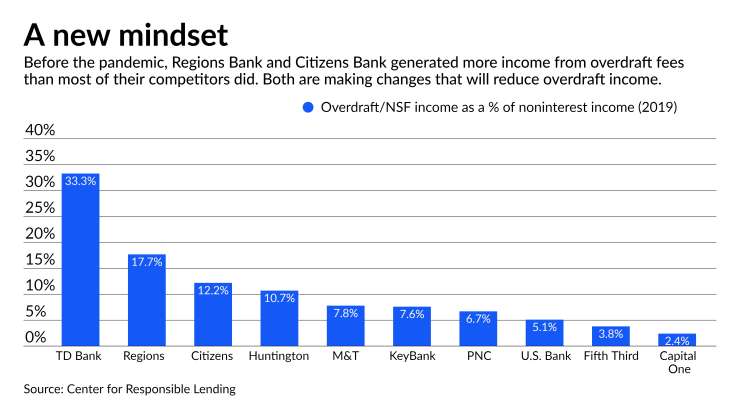Regions Financial and Citizens Financial Group are rethinking their overdraft policies after other regional banks took steps to deemphasize or eliminate the revenue generated from customers who spend more money than they have.
The two banks do not plan to stop charging overdraft fees, but executives with both firms said Tuesday that they expect those fees to continue to decline — in part due to policy changes that the banks plan to make.
Regions plans to revise the order in which it posts transactions so that debits and withdrawals will generally be processed in the order in which they were made, regardless of whether the customer paid by check, debit card, wire or another method.
Chairman and CEO John Turner said Tuesday that revenue from overdraft fees has declined during the pandemic as cash-flush consumers have been better positioned to avoid the charges.
“Part of the reason we've been signaling we don't expect those levels of fees to come back up is because of the changes we are making internally to benefit customers,” Turner said in comments at an industry conference.

Stimulus checks and other government assistance have helped many customers to avoid overdraft fees over the past year, said John Woods, Citizens' chief financial officer. Citizens, of Providence, Rhode Island, provided less detail than Regions about the changes it is planning to implement.
“I think it's an area that we're going to look at and evaluate and analyze whether there are tweaks that we can make to those practices over time to align with what expectations are of our customers and our other stakeholders,” Woods said.
Historically, both Regions and Citizens have relied more heavily on overdraft fee revenue than most of their competitors.
In 2019, 17.7% of Regions’ noninterest income came from fees for overdrafts and from customers who had insufficient funds, according to a report last year by the Center for Responsible Lending. At Citizens, the comparable figure was 12.2%. For all banks with at least $1 billion of assets that provided data to regulators, 5.0% of noninterest income came from such fees in 2019.
Over the past decade, many banks have made changes to their policies on transaction posting order, though consumer advocates have continued to criticize some banks’ practices.
In recent weeks and months, a handful of large and mid-sized banks have announced changes to their overdraft policies in an effort to make it easier for customers to avoid the fees. While
Earlier this month, the $182 billion-asset Ally Financial announced that it would eliminate overdraft fees permanently. Meanwhile, Huntington Bancshares in Columbus, Ohio, launched a new no-interest and fee-free line of credit for consumers who enroll in automatic payback of the loan. The product, which is expected to erode the bank’s overdraft fee revenue, has been dubbed Standby Cash.
Cullen/Frost Bankers in San Antonio said in April that it would
The $153 billion-asset Regions expects growth in other fee categories — including capital markets, mortgages and wealth management — to more than offset reduced overdraft income, Turner said.
In addition to changing the order in which the bank posts transactions, a project that’s been underway for about two years, Regions will also launch
“Our desire is to make more information available to customers so that they can better manage their finances,” Turner said.
Correction: An earlier version of this article incorrectly stated that 17.7% of Regions’ net interest income in 2019 came from fees for overdrafts and from customers who had insufficient funds. The correct figure is 17.7% of noninterest income at Regions.
Correction: An earlier version of this article relied on comments by Regions Financial Chairman and CEO John Turner that mischaracterized the change in transaction posting order that the company is planning to make. Regions has already been posting credit before debits, but Turner’s remarks wrongly suggested that the firm planned to make that change soon. The change that Regions is planning instead involves modifying the order in which various kinds of debits or withdrawals get processed.





